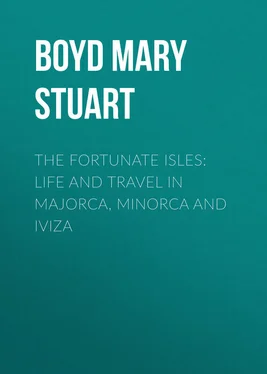Mary Boyd - The Fortunate Isles - Life and Travel in Majorca, Minorca and Iviza
Здесь есть возможность читать онлайн «Mary Boyd - The Fortunate Isles - Life and Travel in Majorca, Minorca and Iviza» — ознакомительный отрывок электронной книги совершенно бесплатно, а после прочтения отрывка купить полную версию. В некоторых случаях можно слушать аудио, скачать через торрент в формате fb2 и присутствует краткое содержание. ISBN: , Жанр: foreign_language, foreign_antique, foreign_prose, Путешествия и география, на английском языке. Описание произведения, (предисловие) а так же отзывы посетителей доступны на портале библиотеки ЛибКат.
- Название:The Fortunate Isles: Life and Travel in Majorca, Minorca and Iviza
- Автор:
- Жанр:
- Год:неизвестен
- ISBN:http://www.gutenberg.org/ebooks/39199
- Рейтинг книги:5 / 5. Голосов: 1
-
Избранное:Добавить в избранное
- Отзывы:
-
Ваша оценка:
- 100
- 1
- 2
- 3
- 4
- 5
The Fortunate Isles: Life and Travel in Majorca, Minorca and Iviza: краткое содержание, описание и аннотация
Предлагаем к чтению аннотацию, описание, краткое содержание или предисловие (зависит от того, что написал сам автор книги «The Fortunate Isles: Life and Travel in Majorca, Minorca and Iviza»). Если вы не нашли необходимую информацию о книге — напишите в комментариях, мы постараемся отыскать её.
The Fortunate Isles: Life and Travel in Majorca, Minorca and Iviza — читать онлайн ознакомительный отрывок
Ниже представлен текст книги, разбитый по страницам. Система сохранения места последней прочитанной страницы, позволяет с удобством читать онлайн бесплатно книгу «The Fortunate Isles: Life and Travel in Majorca, Minorca and Iviza», без необходимости каждый раз заново искать на чём Вы остановились. Поставьте закладку, и сможете в любой момент перейти на страницу, на которой закончили чтение.
Интервал:
Закладка:
Two maimed beggars, the first we had seen in the island, were hobbling about reaping a harvest; and, raised on a little platform, a travelling dentist was extracting juvenile teeth free; to the satisfaction of certain thrifty parents, and to the visible distress of their offspring.
Just below the square was the cattle-market; and on its outskirts we saw, for the first time, a peasant clad in the native male dress that unfortunately has become so rare. The jolly old fellow wore the extremely baggy blue cotton pantaloons, the short black jacket, and wide-brimmed hat that make up so distinctive a costume. He even wore the quaint black shoes that suit the costume, and that seemed a blessed relief from the green and orange elastic-sided boots in vogue.
A threatened shower and an actual thirst gave excuse for seeking refuge in a café. Most of those we glanced into were crowded with peasants, and we hesitated about forcing our way in. Finding at last one that looked more exclusive than the others, we entered and seated ourselves at one of the little tables set under the overhanging tissue-paper decorations.
The Boy and I wanted wine, the Man chose cognac. The active waiter quickly served us with huge tumblers of red wine set in saucers; and placing before the Man a bottle of brandy in which were immersed spiky herbs, left him to help himself. The wine was rich and fruity, the liqueur the Man declared delicious; and while the rain, which was now falling in earnest, pattered down, we sipped and watched the passing life of the street.
Just across the way, at the side entrance to a flourishing baker's shop, two women were frying dough-nuts in a big pan of boiling oil. The elder woman, scraping a segment of batter from the full basin at her elbow, deftly twisted it round her finger, then threw it into the oil, from which a minute later her assistant lifted it out with a long-handled spoon, transformed into a crisp golden ring.
The shower had ceased, the sun was again shining out, and there was much to see; so we paid for our drinks and departed.
"Fourpence!" said the Man, as he pocketed his change. "A penny each for the wine and twopence for the liqueur! It's enough to drive one to drink!"
The one drawback to the complete enjoyment of the fair was the mud. The previous night had been wet, and the streets were inches deep in it. It was a buff-coloured slime of persistently adhesive nature, and not content with thickly coating one's shoes, it tried to drag them off. To walk about in mud three inches deep is fatiguing, so we decided to take the train that was due to leave Inca at one o'clock, instead of waiting for that leaving at four.
It was a merciful fortune that guided us, for the one o'clock train took three hours to cover its twenty miles. Yet the scenery, with its grey-green olive plantations set against a background of beautiful mountains and enlivened with quaintly attired olive-gatherers, was so fine that we did not tire of feasting our eyes upon it.
Our companions on the return journey were mainly men – Palma merchants probably, who had visited the fair as buyers and were anxious to return with the greatest possible expedition. When those who were so adventurous as to wait until the later train would get back to town, or whether they ever reached it at all, history does not relate.
VII
VALLDEMOSA
The fertile plain that occupies the greater portion of the island of Majorca is sheltered from cold winds by the range of mountains that runs along the northern coast. The scenery on the farther side of the mountains is of unusual grandeur, the tracts of precipitous country bordering the sea between Valldemosa and Sóller being exceptionally lovely.
The district, which is almost entirely devoted to olive plantations, is a scantily populated one. And as there are no fondas for a considerable distance, the Austrian Archduke Luis Salvador, who owns much land on the northern coast, has turned a large farm-house on his estate of Miramar into an hospederia , or free lodging-house, for the use of travellers.
There are many hospederias in Spain, but they are generally attached to monasteries and intended for the use of pilgrims to some shrine. That at Miramar is the only instance I know of one supported by a private individual, and many sojourners from far lands like ourselves must have felt grateful to the royal owner for the kindly provision he has made for them.
Within the friendly walls of the Hospederia any sojourner can for three nights find free accommodation, the Archduke providing house-room, linen, service, and fuel. The apartments are always ready, the guest need send no warning of his intended arrival. All he requires to do is to supply himself with food sufficient for the sustenance of his party throughout the visit, as there are no shops within several miles of Miramar, and the servants at the Hospederia are forbidden to sell to the guests.
Very early during our stay at Palma we had purposed journeying northwards to see the places of whose wonders we had heard; but we were so pleasantly interested in our new home and strange environment that it was nearing the close of November before we felt disposed to take the journey.
At stated times diligences run the twelve miles between Palma and Valldemosa, and the charge is only sevenpence-halfpenny. But the diligence goes no farther than Valldemosa, and that is three miles distant from the Hospederia. So, when we had decided to go on the Tuesday morning, we engaged Bartolomé, a good-looking bachelor charioteer, who stabled his carriage and pair of horses in Son Españolet, to drive us thither.
But Tuesday morning, when it came, brought a sudden change of weather. A strong easterly wind was blowing, and the temperature, for the first time since our arrival on these favoured isles, nearly approached cold. Bartolomé was warned that the journey was postponed for a day at least, and we spent the hours of uncertainty in grumbling at the weather, and in consuming the most perishable of the stock of provisions we had laid in for the expedition.
Judging the Majorcan climate by our knowledge of that of other countries, we were all secretly convinced that we had delayed too long, that the weather had probably changed for the winter, and that our little excursion might require to be postponed until spring.
But to our surprise and relief the succeeding morning proved calm and sunny. Having been duly instructed, Bartolomé drove up at ten o'clock precisely, with a jingling of bells that I am convinced set every feminine head in the Calle de Mas a-peer behind its discreetly closed venetian shutters. In appearance Bartolomé was the embodiment of buoyant geniality. His black hair curled in rings about his smiling face, and he had dressed for the occasion in a white suit, a pink shirt, and a pair of bright yellow elastic-sided boots.
Bartolomé's carriage, the sides of whose interior were decorated with four antimacassars on each of which was embroidered a flamboyant representation of a rampant steed, proved both roomy and comfortable, and we were only three in number. Yet when we had got packed in with our luggage, which included sketching materials as well as comestibles, there was scarcely room to stir. Never before had we realized what a cumbersome article food was: or calculated the bulk of – say – the bread even so small a family will consume in three days. And when you add to the loaves the meat and groceries, the vegetables and fruit, necessary for three days' moderate consumption, they will be found to occupy a surprisingly large amount of space.
The first portion of the journey led through the broad, fertile plain north of Palma, where plantations of almond, fig, and olive succeed each other with scarcely a break – that wide expanse whose fruitfulness has gained Majorca the title of the orchard of the Mediterranean. Near where the hills meet the plain we passed the village of Esglayeta, an attractive hamlet consisting of little more than a church and a wayside fonda .
Читать дальшеИнтервал:
Закладка:
Похожие книги на «The Fortunate Isles: Life and Travel in Majorca, Minorca and Iviza»
Представляем Вашему вниманию похожие книги на «The Fortunate Isles: Life and Travel in Majorca, Minorca and Iviza» списком для выбора. Мы отобрали схожую по названию и смыслу литературу в надежде предоставить читателям больше вариантов отыскать новые, интересные, ещё непрочитанные произведения.
Обсуждение, отзывы о книге «The Fortunate Isles: Life and Travel in Majorca, Minorca and Iviza» и просто собственные мнения читателей. Оставьте ваши комментарии, напишите, что Вы думаете о произведении, его смысле или главных героях. Укажите что конкретно понравилось, а что нет, и почему Вы так считаете.











![John Bruce - The Lettsomian Lectures on Diseases and Disorders of the Heart and Arteries in Middle and Advanced Life [1900-1901]](/books/749387/john-bruce-the-lettsomian-lectures-on-diseases-and-disorders-of-the-heart-and-arteries-in-middle-and-advanced-life-1900-1901-thumb.webp)
